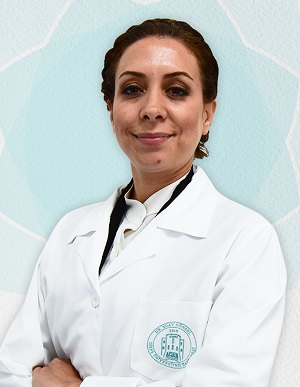
Multiple Sclerosis (MS) is a chronic disease seen in young adults which usually appears and disappears with inflammations, characterised with symptoms which affect the white matter (of the brain and spine) in multiple locations, as well as impacting the immune system causing irreversible damage to the white matter of the brain and the spine. Dr. Suat Günsel University of Kyrenia Hospital Neurology Specialist Assist. Prof. Senem Ertuğrul Mut MD. stated that this disease is more commonly observed between the ages of 20-40 but could also occur in children as well as after the age of 40.
On her statement for the occasion of World MS Day, Assist. Prof. Senem Ertuğrul Mut MD, stated that the disease could start with one or more symptoms such as loss of vision, double vision, loss of balance, numbness in the arms and legs as well as lack of strength, speech problems, dizziness, incontinence and sexual problems.
Assist. Prof. Senem Ertuğrul Mut MD. stated that “Isolated Syndrome is the initial symptoms of MS and most patients diagnosed with these symptoms receive early MS treatments” and also added that MS can be found in patients who have undergone Magnetic Resonance Imaging for other reasons. She continued by saying that these patients are not experiencing any of the common complaints of MS and this is known as radiologically isolated syndrome but in these cases patients do not receive treatment and must be closely monitored.
A number of new causes, treatments and diagnostic methods are discovered each day in terms of the causes, forming mechanisms, diagnosis and treatment of MS. Neurology Specialist Mut, stated that magnetic resonance imaging (MRI) is still the gold standard for the diagnosis of MS and also added that “Cerebrospinal Fluid examinations and evoked cortical potentials are essential methods of diagnosis. MS could mimic many diseases and correct diagnosis could require various examinations. Cerebrospinal fluid analysis is mandatory in many patients.”
Physical Therapy and Rehabilitation are Essential For The Treatment of MS
Dr. Suat Günsel University of Kyrenia Hospital Neurology Specialist Assist. Prof. Senem Ertuğrul Mut MD. continued her statement by saying:
“The onset of the attack of the disease is treated at an early stage with an adequate amount of corticosteroids as well as an effort to prevent the sequel symptoms. We have the opportunity to access all medication that has developed for the treatment of MS simultaneously and earlier than some countries.
Injectable therapies are used since 1995 in order to prevent possible disease progression and more recently, group of oral medications have been developed. If the disease cannot be controlled monthly medications and secondary stage oral medications are also available. In advanced cases, immunosuppressant drugs might be used.
Physical Therapy and Rehabilitation are essential for the treatment of Multiple Sclerosis alongside of medical treatments. Multiple Sclerosis is not considered to be contagious or a hereditary disease. Individuals with MS can have a baby. Multiple Sclerosis is not a hopeless or a fatal disease.
Multiple Sclerosis is a neurological disease which is not a life-threatening disease but it threatens the patient’s life quality, therefore it is important for the patient, family and physician to work together to manage the disease.”